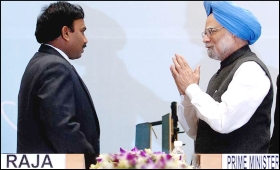|

|
Apprised PM about 2G allocation, Raja tells court
|
|

|
|
| Top Stories |
 |
|
|
|
SME Times News Bureau | 06 May, 2014
Former telecom minister A. Raja told a court in New Delhi on Monday that the 2G spectrum allocation decisions were taken on the proposals of the telecom department and discussions with other cabinet ministers and after properly apprising the prime minister and taking his concurrence.
Claiming innocence in the case, Raja said: "Those prosecution witnesses, who have deposed against me, have done so under fear of being made accused in this case."
"I did not take any unilateral decision, but acted on the proposals of the telecom department and discussions with other cabinet ministers and the then solicitor general (G.E. Vahanvati) and after properly apprising the prime minister and taking his concurrence," Raja told Central Bureau of Investigation (CBI) Special Court Judge O.P. Saini.
Raja, facing trial in the 2G allocation case, was handed over 1,700 questions running into 824 pages March 27 by the court.
The questions are part of the recording of his statement.
While recording his statement, Raja said he acted throughout in the public interest in accordance with the law, regulatory framework and government policy, and "not for any personal gain".
He said there has been no loss to the exchequer, and on the contrary the tariff has come down and tele density has increased manifold, leading to public savings as well as an increase in the revenue share of the government.
Defending himself in the case, the former telecom minister told the court that the case was made against him because "there was a cartel among the old GSM operators, whose interest would have been seriously affected by entry of new operators leading to reduction in tariff".
Raja apprised the judge that the rural tele density was not increasing as the existing operators did not want to go to rural areas because the capital expenditure and operational expenditure are high in comparison to urban revenue.
"The old GSM operators were also taking advantage of non-disclosure of availability of spectrum and sharing spectrum among themselves and preventing new competition, which was opposed by me," Raja said in his reply.
Raja said he acted on the recommendations of the Telecom Regulatory Authority of India (TRAI) and introduced new competition successfully.
Raja said he was not given an opportunity of hearing by the Supreme Court and "the flawed CAG report made the issue sensational without even taking into account the views of the DoT and without properly appreciating government policy and procedure".
He added there was a complete ignorance of policy formation and government functioning by the investigating officers.
"The monitoring of the investigation by the Supreme Court led to the CBI investigating the case in a predetermined manner and fabricating oral evidence, since there was no documentary evidence to support the prosecution," said Raja.
He also blamed "adverse media publicity" saying it also contributed to the case against him.
"My actions do not amount to abuse of official position or any other offence," Raja said in his statement.
Raja started recording his statement early Monday morning.
He replied to over 1,700 questions asked by the court, which adjourned the matter for Tuesday to hear the other accused in the case.
According to the government auditor, Raja was biased while distributing 2G mobile airwaves and operating licences to telecom firms, causing a loss of up to Rs.1.76 lakh crore in revenue to the treasury.
All the accused, including Raja, are out on bail.
In a separate case related to 2G, the court adjourned the recording of statements of Essar Group and Loop Telecom promoters till May 19.
A third set of charges filed by the CBI in the 2G case alleged that promoters of the Essar Group were the real investors and beneficiaries of the spectrum and licences issued to Loop Telecom, which was used as a front company by Essar to acquire 2G licences and spectrum in 2008.
This has been denied by the accused.
The court April 9 gave a questionnaire containing 645 questions to Essar Group and Loop Telecom promoters, who are among the accused.
|
|
|
| |
|
|
|
|
|
|
|
|
|
|
|
|
|
|
| |
| Customs Exchange Rates |
| Currency |
Import |
Export |
US Dollar
|
66.20
|
64.50 |
UK Pound
|
87.50
|
84.65 |
Euro
|
78.25
|
75.65 |
| Japanese
Yen |
58.85 |
56.85 |
| As on 13 Aug, 2022 |
|
|
| Daily Poll |
 |
 |
| PM Modi's recent US visit to redefine India-US bilateral relations |
|
|
|
|
|
| Commented Stories |
 |
|
|
|
|
|
| |
|